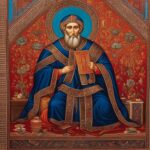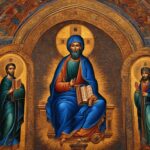Welcome to our article on St. Nerses I the Great, the revered Armenian Catholicos and patron saint of Armenia. As an influential Armenian church leader and a prominent figure in the history of the Armenian Church, St. Nerses I played a significant role in shaping the spiritual and cultural landscape of Armenia.
Born around 310, St. Nerses I the Great was a descendant of St. Gregory the Illuminator, the first patriarch of Armenia. Inspired by his familial connection and a strong sense of calling, St. Nerses embarked on a path of religious service and was ordained as a deacon, priest, and eventually became the Catholicos or chief bishop of the Armenian Church.
Throughout his distinguished career, St. Nerses devoted himself to the well-being of the Armenian people and the growth of the Armenian Church. He established monastic and charitable institutions, including schools, hospitals, and poor houses, recognizing the importance of education and Christian charity. St. Nerses emphasized the role of the church in guiding the Armenian people spiritually, socially, and educationally.
Despite his significant contributions, St. Nerses I the Great faced challenges and criticisms during his tenure as Catholicos. His religious beliefs clashed with the policies of King Arshag II, and he experienced conflicts with King Bab due to his condemnation of the king’s moral depravity. These challenges highlight the difficulties St. Nerses encountered in upholding his Christian principles in the political realm.
St. Nerses I the Great’s dedication to the spiritual well-being of his people earned him recognition and awards, with many considering him the founder of Christian charity in Armenia. His enduring influence led to his recognition as a saint, and he is associated with several miracles. St. Nerses’ legacy continues to shape the Armenian Church and society, inspiring future generations to uphold the values he cherished.
Join us as we delve into the life, work, and continuing influence of St. Nerses I the Great, exploring his personal testimonies, the challenges he faced, and the enduring impact he has had on the Armenian Catholic Church and the Armenian people.
Key Takeaways:
- St. Nerses I the Great was a prominent Armenian Catholicos and patron saint of Armenia.
- He was a descendant of St. Gregory the Illuminator, the first patriarch of Armenia, and played a vital role in the history of the Armenian Church.
- St. Nerses established monastic and charitable institutions, emphasizing education, Christian charity, and the church’s role in guiding the Armenian people.
- He faced challenges and criticisms due to his religious beliefs and clashed with political leaders who opposed his principles.
- St. Nerses’ contributions were widely recognized, and he is considered the founder of Christian charity in Armenia. He is associated with several miracles and has had a lasting impact on the Armenian Catholic Church and society.
Early Life and Background
St. Nerses I the Great, also known as Nerses the Parthian, was born around 310. He was the son of At’anagines and the Arsacid princess Bambishn, a sister of King Tiran and a descendant of King Khosrov III. St. Nerses’ grandfather was Catholicos Husik, and his paternal great-grandfather was St. Gregory the Illuminator, the founder of the Armenian Church.
Despite his noble lineage, St. Nerses experienced a calling to a higher purpose. He felt the weight of his heritage and the responsibility to carry on the spiritual legacy of his forefathers. This deep sense of duty would shape his destiny and guide his path towards becoming a revered Armenian Catholicos.
Call to Religious Life
The call to religious life came to St. Nerses against the backdrop of a rapidly evolving Christian landscape in Armenia. The country had witnessed the conversion of its king to Christianity through the efforts of his great-grandfather, St. Gregory the Illuminator. As the spiritual leader of the Armenian people, St. Gregory’s influence was profound and enduring.
Inspired by his ancestor’s devotion and the spiritual needs of his community, St. Nerses embraced a life of service and sacrifice. He sought to carry on the legacy of St. Gregory, dedicating himself to the Armenian Church and the well-being of its followers.
“I have heard the calling of the divine within me, echoing through the generations of our sacred lineage. I am but a vessel, chosen to continue the noble work of our ancestors and guide our people towards the light.”
With humility and unwavering faith, St. Nerses accepted the mantle of leadership, knowing that the path he would tread would be challenging yet filled with blessings.
Call to Religious Life
Despite his secular background, St. Nerses I the Great was called to religious life and ordained as a deacon, then a priest, ultimately assuming the role of the Catholicos or chief bishop of the Armenian Church. His journey from a non-religious upbringing to becoming a revered spiritual leader is a testament to his unwavering faith and strong calling.
St. Nerses’ path to religious life was influenced by his connection to St. Gregory the Illuminator, the founder of the Armenian Church. It was believed that his lineage and deep devotion to Christian values made him the most suitable person to lead the church and guide the Armenian people.
“St. Nerses humbly accepted this responsibility and dedicated himself to serving the spiritual needs of his people. He viewed his appointment as a divine calling, a chance to bring the teachings of the Armenian Church closer to the hearts and minds of the faithful.”
As the Armenian Catholicos, St. Nerses I the Great worked tirelessly to provide spiritual guidance and support to the Armenian bishops and clergy. He understood the importance of nurturing the religious community and fostering a deep connection between the church and its followers.
Through his exemplary leadership and commitment to the spiritual well-being of his people, St. Nerses I the Great left an indelible mark on the Armenian Church, solidifying his legacy as a revered spiritual leader.
See below for a comprehensive table highlighting the key moments and achievements in the life of St. Nerses I the Great:
| Year | Event |
|---|---|
| 310 | Born around this time |
| 353 | Ordained as a deacon |
| 365 | Ordained as a priest |
| 373 | Assumed the role of Catholicos |
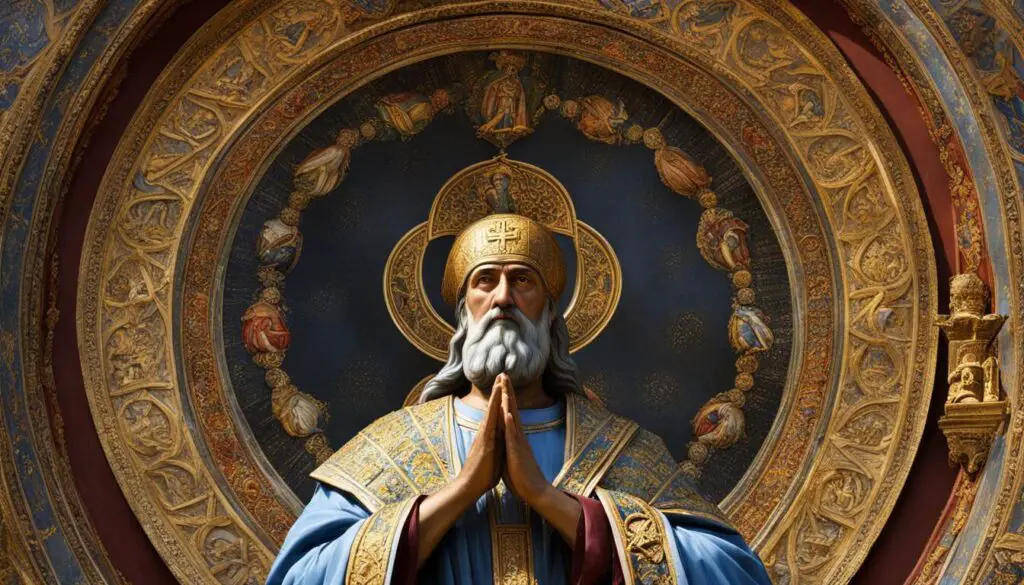
St. Nerses I the Great’s Quotes:
“The spiritual well-being of our people is our utmost priority, and we must strive to guide them on the path of righteousness and salvation.”
“Let us embrace the teachings of the Armenian Church and embody Christian virtues in our daily lives. Through our faith and actions, we can bring about a positive transformation in our society.”
Work
As the Catholicos, St. Nerses I the Great was deeply committed to the work of the Armenian Church. Recognizing the importance of education and its role in spreading Christian teachings, he established monastic and charitable institutions that included schools, hospitals, leprosaria, and poor houses. These institutions aimed to serve the needs of the community and provide a solid foundation for the promotion of faith and knowledge.
“Education is the key to enlightenment and the path to a stronger, more prosperous society. Through the establishment of schools, St. Nerses I the Great aimed to empower generations with the teachings of the Gospel, fostering a love for learning and a deeper understanding of the Armenian faith,” said Archbishop Aram, a scholar of Armenian history.
Inspired by the teachings of St. Gregory the Illuminator, St. Nerses sent monks throughout the country to preach the Gospel and spread Christian values. Their mission was not only to transmit spiritual teachings but also to promote the importance of compassion, love, and service to others. These efforts not only strengthened the faith of the Armenian people but also created a lasting impact on society, as the message of charity and goodwill continues to resonate in the hearts of the Armenian community.
Schools and Education
St. Nerses I the Great believed that education was the cornerstone of a progressive society. He championed the establishment of schools that provided a comprehensive education, encompassing both religious and secular studies. These schools aimed to provide the Armenian youth with the tools necessary for personal and intellectual growth, empowering them to become moral leaders in their communities.
The schools founded under St. Nerses’ guidance not only taught reading, writing, and arithmetic but also instilled moral values and a deep sense of responsibility towards others. The education provided emphasized the importance of spiritual development, ethical conduct, and community engagement.
“Through education, we can shape the minds and hearts of future generations. St. Nerses I the Great understood that investing in the education of our youth is an investment in the future of the Armenian nation,” noted Dr. Anahit, a renowned Armenian historian.
St. Nerses’ vision for education extended beyond the classroom. He encouraged the use of Armenian as the language of instruction and worked to preserve the cultural and linguistic heritage of the Armenian people. By promoting education, St. Nerses laid the foundation for the intellectual and spiritual growth of the Armenian community, ensuring the endurance of their identity and faith.
Charitable Institutions
In addition to educational institutions, St. Nerses I the Great devoted himself to the establishment of charitable institutions. These institutions aimed to provide aid and support to the most vulnerable members of society, including the poor, the sick, and the marginalized.
Hospitals, leprosaria, and poor houses were established under St. Nerses’ guidance, providing compassionate care to those in need. These institutions became beacons of hope, offering comfort and solace to the less fortunate. St. Nerses emphasized the importance of treating all individuals with dignity and respect, regardless of their social or economic status.
“Charity knows no bounds. St. Nerses I the Great’s establishment of charitable institutions reflects his unwavering commitment to love, compassion, and the alleviation of human suffering. Through his actions, he set an example for all of us to follow in the pursuit of a more just and caring society,” shared Father Sarkis, a prominent theologian.
The charitable institutions founded by St. Nerses served as living testimonies to the power of Christian charity and its ability to transform lives. They became integral parts of Armenian society, inspiring generations to embrace the spirit of selflessness and service.
Monastic Institutions
St. Nerses I the Great recognized the importance of monasticism in the spiritual life of the Armenian Church. He established monastic institutions that served as centers of prayer, contemplation, and devotion.
Monks residing in these institutions dedicated their lives to prayer and the pursuit of spiritual enlightenment. They played a crucial role in providing guidance, support, and spiritual counseling to the members of the Armenian community. The monastic institutions established by St. Nerses became pillars of faith and sanctuaries of peace.
“Monasticism holds a special place in the Armenian Church. St. Nerses I the Great’s establishment of monastic institutions fostered a deep connection between the spiritual leaders and the faithful, nurturing a sense of community and fostering spiritual growth,” explained Bishop Ararat, an expert in Armenian religious traditions.
Through the establishment of monastic institutions, St. Nerses I the Great ensured the continuity of spiritual teachings and the preservation of Armenian religious traditions. These institutions acted as guardians of the faith, passing down the wisdom and knowledge of generations past to future generations.
Spiritual Life and Philosophy
St. Nerses I the Great, the Armenian Catholicos, was not only a religious leader but also a deeply spiritual individual. His unwavering commitment to Christian Orthodox beliefs shaped his philosophy and guided his actions throughout his life.
One of the core principles that St. Nerses upheld was moral purity. He emphasized the importance of leading a virtuous life and encouraged others to follow the path of righteousness. His teachings centered around ethical behavior, kindness, and compassion towards others.
The sanctity of marriage and family life held great significance in St. Nerses’ spiritual outlook. He believed in the sacred bond between husband and wife, emphasizing the role of the family unit as the foundation of society. St. Nerses advocated for nurturing strong family relationships and fostering a harmonious environment within households.
As a staunch defender of the Armenian Church, St. Nerses recognized the importance of preserving its values and traditions. He worked diligently to eliminate influences from other religions, particularly Zoroastrianism, ensuring that the Armenian church remained steadfast in its Christian Orthodox beliefs.
St. Nerses saw the church not only as a place of worship but also as a guardian of the Armenian people in their spiritual, social, and educational aspects. He believed in the transformative power of faith and encouraged the community to seek solace, guidance, and enlightenment within the church.
St. Nerses I the Great’s spiritual life and philosophy continue to inspire and influence the Armenian community, serving as a testament to his unwavering dedication as a spiritual leader.
Challenges and Criticisms
During his time as Catholicos, St. Nerses I the Great faced significant challenges and criticisms. His unwavering commitment to his religious beliefs put him at odds with the policies of King Arshag II, who favored Arianism, a heretical form of Christianity that rejected the divinity of Jesus Christ.
This clash of religious differences caused friction between St. Nerses and the king, leading to a turbulent relationship and ultimately resulting in the Catholicos’ exile for nine years. Despite the challenges he faced, St. Nerses remained steadfast in upholding his Christian principles and defending the orthodoxy of the Armenian Church.
“In the face of religious differences, St. Nerses I the Great stood firm in his beliefs, even when it meant facing exile. His unwavering commitment to orthodoxy and his dedication to the Armenian Church serve as an inspiration to all those who face adversity.”
In addition to his conflicts with King Arshag II, St. Nerses also experienced challenges in his dealings with King Bab, Arshag’s son. The Catholicos openly condemned the king’s moral depravity, further straining their relationship. These challenges underscore the difficulties St. Nerses encountered as he navigated the political landscape while remaining true to his Christian values.
St. Nerses I the Great’s ability to withstand these challenges and criticisms showcases his unwavering faith and commitment to his role as a spiritual leader. His steadfastness in the face of adversity has made him an enduring symbol of resilience and courage within the Armenian Catholic Church.

Recognition and Awards
St. Nerses I the Great’s contributions to the Armenian Church and society were widely recognized and appreciated. His dedication to Christian charity and the establishment of various institutions aimed at helping the poor and needy solidified his place as a renowned figure in Armenian history.
“St. Nerses I the Great’s commitment to Christian charity laid the foundation for a legacy of compassion and service that remains an integral part of Armenian culture.”
Throughout his tenure as the Armenian Catholicos, St. Nerses I the Great emphasized the importance of helping those less fortunate. His devotion to Christian charity established him as the pioneer of benevolence in Armenia.
St. Nerses I the Great’s legacy as a devoted spiritual leader and advocate for social and educational development continues to be celebrated in Armenian culture. The impact of his work is still felt today, as his teachings and commitment to Christian values shape the lives of countless individuals.
| Awards and Recognitions |
|---|
| Founding Father of Christian Charity in Armenia |
| Patron Saint of Social Welfare |
| Honored for Establishing Various Charitable Institutions |
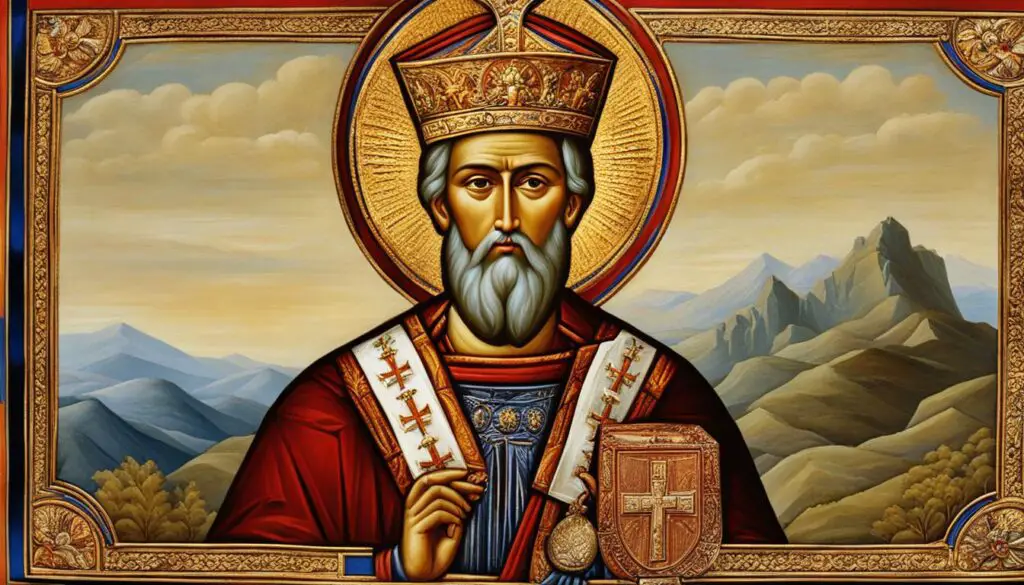
The impact of St. Nerses I the Great’s work in promoting Christian charity and compassion continues to inspire individuals today. His commitment to helping the poor and needy serves as a timeless example of the importance of serving others.
Miracles and Path to Sainthood
Throughout his life, St. Nerses I the Great became associated with numerous miracles, although the specific details may vary in different accounts. These miracles, attributed to his faith and devotion, further solidified his reputation as a holy figure within the Armenian Church.
The impact St. Nerses had on the Armenian Church and society, combined with the reverence he inspired among the faithful, eventually led to his recognition as a saint. The path to sainthood typically involves a rigorous investigation into the candidate’s life, works, and miracles, ensuring their authenticity and profound spiritual significance.
For St. Nerses I the Great, this process of canonization attests to the profound impact he had on the lives of those around him and the enduring legacy he left behind.
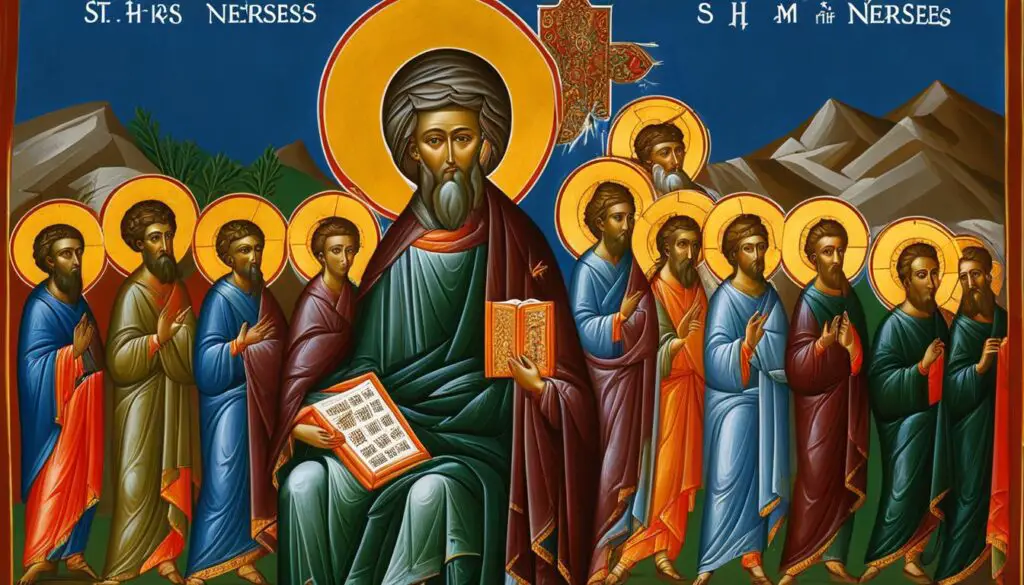
Legacy and Continuing Influence
St. Nerses I the Great’s legacy and influence extend far beyond his lifetime. His contributions to the Armenian Church, especially in the realms of charity and education, have left a lasting impact on the community.
Throughout his tenure as Armenian Catholicos, St. Nerses established numerous monastic and charitable institutions, including schools, hospitals, leprosaria, and poor houses. These institutions continue to serve the Armenian people, providing education, healthcare, and support to those in need.
Furthermore, St. Nerses’ unwavering commitment to upholding the principles and values of the Armenian Church has been instrumental in shaping Armenian society. His emphasis on moral purity, the sanctity of marriage, and family life has resonated with generations within the community, guiding them on the path of spiritual growth and righteousness.
The Armenian Church, with St. Nerses as its devoted leader, continues to be a guiding light for its followers. It remains the cornerstone of Armenian culture and identity, promoting not only religious traditions but also social and educational development.
“The influence of St. Nerses I the Great on the Armenian Church and community cannot be overstated. His dedication to serving the spiritual needs of his people has laid the foundation for a thriving and vibrant Armenian Church that continues to impact lives today.” – Archbishop Gabriel Ayvazian
St. Nerses I the Great’s legacy serves as an inspiration for future generations, reminding them of the importance of faith, service, and devotion. His selfless acts of charity and his steadfast commitment to the Armenian Church have left an indelible mark on the hearts and minds of the Armenian people.
As the patron saint of Armenia, St. Nerses I the Great’s continuing influence can be felt in the lives of countless individuals who seek solace, guidance, and inspiration through his teachings and example.
The image above depicts St. Nerses I the Great, a symbol of his enduring presence and influence in the Armenian Church and society.
Reflections and Personal Testimonies
The life and work of St. Nerses I the Great have touched the hearts and souls of countless individuals, leaving a lasting imprint on the Armenian community. Through personal testimonies and reflections, we gain deeper insights into the profound influence he had as an Armenian Catholicos and spiritual leader.
“St. Nerses I the Great’s teachings truly resonate with me. His unwavering dedication to serving the spiritual needs of his people serves as an inspiration for me in my own spiritual journey.” – Anna M.
Those who have studied St. Nerses’ life and teachings have found solace and guidance in his unwavering faith and commitment to Christian values.
- Reflections on St. Nerses’ Compassion: His deep sense of compassion for the poor and vulnerable serves as a reminder to us all to prioritize acts of kindness and extend a helping hand to those in need.
- The Impact of St. Nerses’ Example: Many individuals have been inspired to follow in the footsteps of St. Nerses, dedicating their lives to works of charity and spreading the love and teachings of Christ.
- St. Nerses’ Emphasis on Education: His commitment to education and the establishment of schools have empowered countless individuals to pursue knowledge and grow intellectually.
These personal testimonies and reflections highlight the enduring legacy of St. Nerses I the Great, whose spiritual leadership continues to inspire and shape the lives of believers.
Testimonial: Sarah K.
“As someone who has delved deep into the life and teachings of St. Nerses, I can confidently say that his devotion to God and the Armenian people is truly unmatched. His example has not only strengthened my faith but has also motivated me to make a positive impact in my own community.”
These reflections and personal testimonies serve as a testament to the profound influence of St. Nerses I the Great, showcasing how his unwavering faith and dedication continue to inspire and uplift the Armenian community to this day.
Conclusion
St. Nerses I the Great, as the patriarch of the Armenian Church, played a pivotal role in the history of Armenia and the development of the Armenian Church. His unwavering commitment to Christian charity, education, and the spiritual well-being of his people has earned him a place of reverence and respect among the Armenian community. Throughout his life, St. Nerses exemplified the values of faith, service, and devotion, leaving behind a lasting legacy that continues to inspire and guide generations to come.
Despite facing numerous challenges and criticisms, St. Nerses remained steadfast in upholding his Christian principles, even in the face of political opposition. His tireless efforts to establish monastic and charitable institutions, promote moral purity, and preserve the values of the Armenian Church have left an indelible mark on Armenian society.
St. Nerses I the Great’s enduring influence as a patron saint of Armenia is a testament to the profound impact he had on the Armenian Church and its followers. His life serves as a beacon of inspiration, reminding us of the importance of faith, service, and dedication to our spiritual well-being. Today, the legacy of St. Nerses I the Great continues to ignite the hearts of the faithful, nurturing their connection to the Armenian Church and reinforcing the ideals of love, compassion, and Christian Orthodox beliefs.
FAQ
Who was St. Nerses I the Great?
St. Nerses I the Great was a prominent Armenian Catholicos and saint, born around 310 and believed to have died in 373. He was the patriarch of the Armenian church from about 353 and played a significant role in the history of Armenia.
What was St. Nerses I the Great’s background?
St. Nerses I the Great was a descendant of St. Gregory the Illuminator, the first patriarch of Armenia. He was the son of At’anagines and the Arsacid princess Bambishn, and his grandfather was Catholicos Husik. His paternal great-grandfather was St. Gregory the Illuminator.
Why did St. Nerses I the Great become a religious leader?
St. Nerses I the Great was called to religious life due to his connection to St. Gregory the Illuminator and the belief that he was the most suitable person to lead the Armenian Church. He humbly accepted this responsibility and dedicated himself to serving the spiritual needs of his people.
What were St. Nerses I the Great’s contributions to the church?
As the Catholicos, St. Nerses I the Great established monastic and charitable institutions, including schools, hospitals, leprosaria, and poor houses. He recognized the importance of education and sent monks throughout the country to spread Christian teachings.
What were St. Nerses I the Great’s spiritual beliefs?
St. Nerses I the Great was committed to Christian Orthodox beliefs. He promoted moral purity, the sanctity of marriage, and family life. He emphasized the role of the church as the guardian of the Armenian people in their spiritual, social, and educational aspects.
What challenges did St. Nerses I the Great face?
St. Nerses I the Great faced challenges and criticisms during his time as Catholicos. His religious beliefs clashed with the policies of King Arshag II, resulting in his nine-year exile. He also experienced conflicts with King Bab due to his condemnation of the king’s moral depravity.
How is St. Nerses I the Great recognized?
St. Nerses I the Great is widely recognized as the founder of Christian charity in Armenia for his establishment of various institutions and his commitment to helping the poor and needy. His legacy as a devoted spiritual leader and advocate for social and educational development continues to be celebrated in Armenian culture.
What was St. Nerses I the Great’s path to sainthood?
St. Nerses I the Great’s impact on the Armenian Church and society, along with the reverence he inspired, led to his eventual recognition as a saint. The process of sainthood involves a rigorous investigation of the candidate’s life, works, and miracles before official canonization takes place.
What is St. Nerses I the Great’s continuing influence?
St. Nerses I the Great’s contributions to the Armenian Church, particularly in the areas of charity and education, have had a lasting impact. His principles and values continue to guide the church and shape Armenian society, serving as an inspiration for future generations.
What do personal reflections and testimonies reveal about St. Nerses I the Great?
Personal testimonies and reflections from those who have studied St. Nerses I the Great’s life and teachings offer insights into the significance of his spiritual leadership and the impact he had on the Armenian people. These reflections provide a deeper understanding of his enduring influence.
What is the significance of St. Nerses I the Great in the history of Armenia?
St. Nerses I the Great, as the patriarch of the Armenian church, played a pivotal role in the history of Armenia and the development of the Armenian Church. His commitment to Christian charity, education, and the spiritual well-being of his people has earned him a place of reverence and respect.


